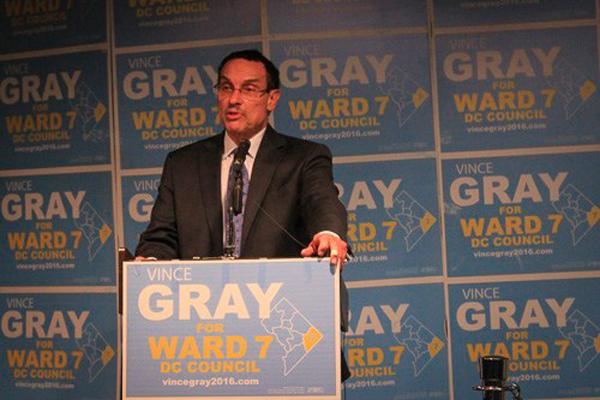With admissions pamphlets emblazoned with monuments, tour guides sharing stories about run-ins with prominent politicians, internships at government agencies and the ever-present “Only at GW” hashtag, the University attracts prospective students in part with the promise of living the ultimate Capitol lifestyle.
GW’s D.C. location and easy access to its thriving cultural scene and career opportunities have long been central to its appeal. But since President-elect Donald Trump’s victory, some have feared how his administration could make D.C. and the University less appealing.
GW’s campus, in one of the most liberal cities in the nation according to The Economist, didn’t contribute to Trump’s November win. Nearly 93 percent of D.C. voted for Trump’s opponent, Democratic presidential nominee Hillary Clinton, and at GW, the result was greeted with shock, a 400-student walkout and for some, reevaluating career plans in government.
Former District Mayor and current D.C. Councilman Vincent Gray told the New York Times in November that he was worried some might stay away from the District “because of the image they have of the Trump administration.”
Some faculty have said they’re concerned about the impact some of Trump’s policies could have on University priorities like scientific research and international student recruitment.
Charles Garris, the chair of the Faculty Senate’s executive committee, said Trump has been “a major topic of conversation” among faculty members.
He said that there would likely be some prospective students who “won’t want to come,” but that there should still be enough applicants to replace those who aren’t interested.
“Washington is a draw, but it’s not necessarily a draw because of the White House,” he added. “It’s because it’s a great city. Whether Trump is in the White House or not in the White House, Washington is Washington.”
Garris said the main concerns among faculty were that Trump could impose visa restrictions making it difficult for international students to enroll and restrict federal funding for certain research topics, like climate change.
Enrollment would likely be impacted most by the U.S. economy’s overall health, which determines whether families can afford GW tuition.
University officials said they were confident D.C. would still be a major reason for students to come to GW.
Laurie Koehler, the vice provost for enrollment management and retention, said in an email that with Trump in the White House, D.C. “will continue to be an exciting, vibrant city for college students.”
“No matter which political administration is in office, students who are interested in global and world affairs will continue to be interested in studying in Washington, D.C. because of the nearby access to embassies, federal agencies, international organizations and cultural institutions,” she said.
Officials have not directly criticized Trump, but University President Steven Knapp signed letters supporting a program shielding young undocumented immigrants from deportation and calling for action to combat climate change.
Provost Forrest Maltzman said in an email that the District would continue to be a draw for both students and faculty members.
“Regardless of one’s political ideology, virtually everyone I have talked to believes Washington is a great place to work and live,” he said. “Over the years, I have recruited a lot of faculty, and Washington has always been one of our best selling points. I have no doubt that it will continue to be this.”
He added that if a potential faculty member or researcher was concerned about the impact of the presidential administration, he would highlight the direction of the University and the other opportunities living in D.C. presents.
Maltzman and Koehler declined to say whether faculty or prospective students have voiced concerns about the University’s appeal under the Trump administration.
Patrick Kennedy, the chairman of the Foggy Bottom and West End Advisory Neighborhood Commission, said the District had flourished under Republican administrations in the past and saw a possible expansion in government spending under Trump as a potential boon to the city.
He said the bigger obstacle to growth in the District was the increasing cost of living, but expected D.C.’s allure would remain regardless of which administration was in power.
“This has always been a liberal city,” Kennedy said. “The vibe, politics and culture of this city has always been progressive. I’m not worried about that changing too much.”





